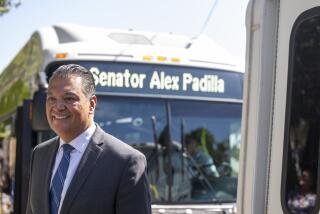Gov. Backs Greenhouse Gas Strategy
Gov. Arnold Schwarzenegger will announce today his support for a strategy to combat global warming that has drawn criticism from Republicans and business leaders, aides said Monday.
The market-based approach would include controversial “cap-and-trade” requirements mandating greenhouse gas producers who exceed certain tonnages of harmful emissions to buy credits from other companies that have lowered emissions.
Schwarzenegger is expected to make the announcement, endorsing major components of his climate action team’s plan, at a summit he has convened in San Francisco this afternoon bringing together economists, investors, business executives, environmentalists and lawmakers.
Legislative approval could be needed to enact key elements of the 1,300-page plan, including the cap-and-trade system and a registry for businesses to report the amounts of greenhouse gases they emit.
Terry Tamminen, special advisor to the governor on environment and energy issues, said that under the market-based program, power plants, for instance, would be able to buy emissions credits not just from other power plants but also from other industries, including timber companies that set aside forests to trap carbon dioxide, a key greenhouse gas. Tamminen said such broad access to the credit market would help to drive prices down.
Limited versions of such market-based programs are operating in Chicago and Europe, he said, adding that California’s would go much further. Schwarzenegger has said he wants to reduce greenhouse gases by 80% by 2050, putting the state ahead of the rest of the world.
Tamminen said one-third of those reductions could come from a market-based cap-and-trade program. The plan calls for two years of study to design the program.
Cap-and-trade programs are opposed by the Bush administration as well as by many of Schwarzenegger’s business backers, including major oil companies and the California Chamber of Commerce.
Allan Zaremberg, president of the chamber, said his members would “be concerned about any cap program that encourages arbitrary reductions in emissions and encourages companies to migrate operations to other parts of the world where there are no carbon dioxide controls.”
Tamminen said industries had expressed similar concerns 35 years ago when the Clean Air Act was put into place but had not left the state or hurt the economy through compliance.
Another high-ranking administration source said that Schwarzenegger was well aware of the business concerns and wanted careful study and design but that it would happen.
“He’s endorsing the concept and saying we need to have this, but there’s an acknowledgment this has to be done carefully,” the source said.
By making the endorsement, the incumbent governor will be siding with environmentalists and Democrats in an election year, a strategy some Republican strategists said could work in his favor.
GOP analyst Dan Schnur, who teaches public policy at USC, said Schwarzenegger “outflanked” his Democratic challengers by having his climate action team unfurl the lengthy report last week and will win over mainstream voters in both parties who want something done about global warming.
Recent polls back him up. In June, the Public Policy Institute of California found that 69% of Californians surveyed said they supported the governor’s global warming reduction targets. A national Republican polling firm recently found that American voters believe by more than 2 to 1 it is possible to reduce the effects of global warming.
But others said it could hurt him, particularly with Republican Party regulars who oppose government regulation and who are key to campaigning and getting out the vote.
“He’s walking a fine line,” said Larry Gersten, a political science professor at San Jose State. “He’s trying to ... scoop up those votes he had in 2003 without losing the votes on the right, and he’s in a rather precarious position.”
Philosophical differences among Schwarzenegger’s staffers, legal challenges by automakers and hostile actions by the Bush administration could also stymie pieces of the plan.
One-third of the greenhouse gas reductions outlined in the climate action team’s report would come from a tailpipe control law already in place, sponsored by Assemblywoman Fran Pavley (D-Agoura Hills). Automakers are challenging that law in court, arguing that California does not have the legal right to regulate carbon dioxide, a major greenhouse gas.
“This is a tough case,” said lawyer Jim Marston of Environmental Defense, a national environmental group that has intervened on the automakers’ lawsuit. He said the U.S. Environmental Protection Agency also needs to sign a waiver approving the Pavley law and said California might have to wait for a new president for that to happen.
But he said California has quietly inserted a police powers clause into laws giving them the right to regulate greenhouse gases to protect public health.
Adding another potential roadblock, the National Highway Traffic Safety Administration recently said in a new fuel economy rule that no state has the right to regulate carbon dioxide.
“The real question is while we’re sitting here congratulating ourselves, are the feds getting ready to cut our throats?” said V. John White, an environmental lobbyist.
The Center for Biological Diversity, an environmental group, sued the highway agency on Thursday, seeking to have the fuel economy rule thrown out.
Schwarzenegger said in a news conference last week, “I have to say that the federal government has so far fallen short with showing leadership when it comes to the environment. I think that I, as governor, don’t want to wait for the federal government or for any other states, as far as that goes [to act on global warming].... California has always been innovative and has always been bold about those kind of things, and I think that this is a very bold move, this report.”
The plan outlines four dozen initiatives, many of which do not need federal approval.
For example, it seeks to persuade farmers to plant grass and rice for use in manufacturing “bio-fuel” to replace oil and gas, would require utilities to buy “clean” power and would call for carbon dioxide to be trapped in vast forests or buried in caverns.
Supporters say progress has already been made, often at Schwarzenegger’s behest.
The state Board of Forestry is identifying lands and working with an existing voluntary emissions registry already in place. The Public Utilities Commission adopted key pieces of the governor’s solar power initiative after it failed in the Legislature; those actions are part of the new package.
A dozen more bills that would implement other measures in the plan were introduced this week.
But many business leaders are nervous. Representatives of most oil companies, concrete makers, rubber producers and automakers argue that global warming is an international problem that shouldn’t be tackled by a single state.
Jack Coffey, Chevron’s government affairs manager, said most oil companies -- except for BP, the Royal/Dutch Shell Group and others based in Europe -- oppose mandatory reporting or caps on greenhouse emissions.
“The problem is there is pressure put on California industries to reduce, and no one else is doing it, not our neighbors over in Nevada or Oregon or Arizona,” said Frank Sheets, a spokesman for Texas Industries Inc., a cement manufacturer with plants in Riverside and near Victorville. “We’d rather see a national system..”
Plan backers note California wants to work with neighboring states, and that 10 other states are moving to adopt tough tailpipe emissions laws.
Schwarzenegger said last week he would bring the report to the next Western governors conference.
There are also growing divisions over global warming within industry groups.
“Business is not monolithic in its opposition,” said Tamminen.
Many venture capitalists and some utilities are eager to see the new technology initiatives move forward.
A letter signed by BP, the London-based oil giant; Pacific Gas and Electric; a Silicon Valley business association; and three environmental groups commended the governor for the climate action plan’s call for “a rigorous and comprehensive system for reporting greenhouse gas emissions” and its recommendations “to provide credit to businesses that take early action to reduce emissions.”
More to Read
Get the L.A. Times Politics newsletter
Deeply reported insights into legislation, politics and policy from Sacramento, Washington and beyond. In your inbox three times per week.
You may occasionally receive promotional content from the Los Angeles Times.











